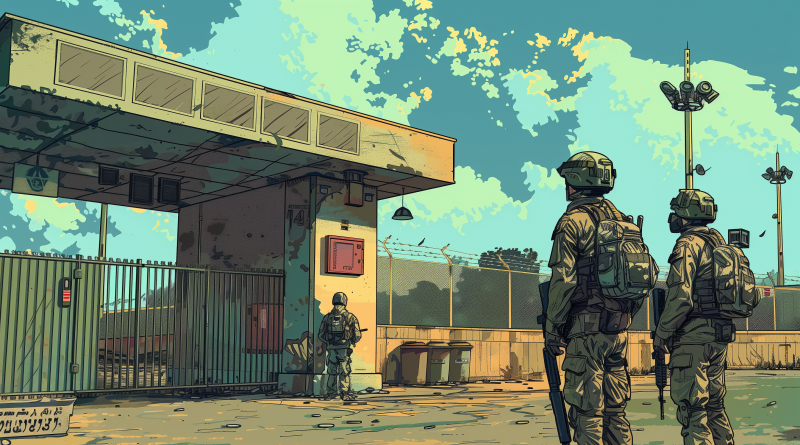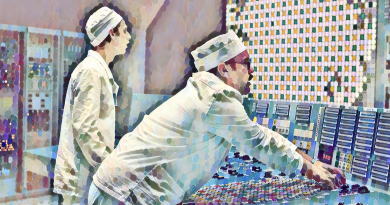Semantics & Semitics: Why We Need Better Language To Discuss Israel.
A couple of months back, I unwittingly sparked a firestorm– this phrase alone could honestly constitute Discarded Memoir Titles No. 267- when I asked whether my college Facebook group didn’t have a Jewish subgroup. Quickly, the post blew up, and two prominent members of the Facebook group started a new subgroup (MoT, for Members of the Tribe)! Hurrah, right? But one of the only rules listed in the group was that the group would not tolerate anti-Zionist content. A minor shitstorm ensued with comments ranging from “that’s unfortunate” to “this is appalling.” And one member, with some bravado, declared that she was creating an unapologetically Zionist group called Am Yisrael Chai. For the uninitiated or non-Tribesmen among ye (I say this as though I actually speak Hebrew, which I don’t), it means “The Jewish People Live,” as in, “may the Jewish people continue to survive.” But it’s a problematic phrase because, among other reasons that I’ll unpack below, it inappropriately conflates Yisrael The Jewish People with Yisrael The Mostly-Jewish State By Way Of Its Ethno-Statehood Enforced By Crazy Right Wing Ruling Coalition.
So, dear readers! Let’s take a walk through the past century and some and talk about some problematic and complicated phrases that have emerged and become rallying cries over the years. We’ll look at each one and consider Both Sides of the debate and see what we learn.

Yisrael, Yisrael, and Yisrael.
The core of the Am Yisrael Chai debate is not the historic popularization of the term, which we’ll get to in a moment, but rather the fundamental linguistic challenge presented by three different meanings of one word, Yisrael. The meaning of the word is generally understood to mean something like “God contended.” Rabbi Rachel Barenblat explains it artfully: “‘Israel’ is the name that was given to Jacob after he spent the night wrestling with an angel of God. ‘The people Israel’ can be interpreted as ‘Godwrestling people’—’people who take on the holy obligation of engaging with the divine.'” As Judaism is a religion of lively debate, I interpret it as a prophetically tongue-in-cheek reference to the fact that at the core of Judaism is a process of endless debate and contention through which humans are able to interpret writings about the mitzvot (commandments) using rational thought, free will, and ethics.
Throughout this process we are, in effect, wrestling with God.
But the fact is now that Yisrael is not only a first name, but also the name of three closely related concepts or entities that must be considered to be at least somewhat distinct from one another:
Medinat Yisrael, the state of Israel, is a country. It operates, at least theoretically, within the frameworks of modern statehood.
Eretz Yisrael, the land of Israel, refers to the historical geographies in which part or all of the state of present-day Israel is located. The distinction between Eretz and Medinat are significant and the failure to distinguish between the two have been criticized by everyone ranging from the hiloni (secular) Israeli left wing to the late Lubavitcher Rebbe, Menachem Mendel Schneerson (1902-1994). Schneerson and I might not have agreed on much else about Israel, as his concern was not that Israel was doing bad things to the Arabs, but rather that the secularism of the state would undermine its integrity. (That’s a thoroughly complicated topic for another day).
Finally, there is Yisrael, the Jewish people, or, ha’am ha’yehudi. The Jewish people exist in Medinat Yisrael as well as in what Jews call the diaspora, although this term is also not without its critics given that the vast majority of human-years-lived on planet earth by Jews have been outside of the state of Israel– substantially in the United States, where Jews have enjoyed an unprecedented degree of prosperity and freedom from the various and sundry atrocities of regimes ranging from the Spanish Inquisition to the Nazi Holocaust to the Russian Empire and its pogroms.
So, now that we’ve differentiated these three things, let’s move on to the first phrase in question: am yisrael chai.

Am Yisrael Chai “עַם יִשְׂרָאֵל חַי”
“Am Yisrael Chai” is translated as “the Jewish people live.” It is often interpreted as a rallying cry for the protection of Medinat Yisrael. But this is a misappropriation of statists who inappropriately conflate “the Jewish people at large” with “the state of Israel, as it is imagined by the right-wing coalition government, some iteration of which has run the country for most of the past 50+ years.” Michele Goldberg recently wrote a nuanced article on this subject of intertwining Zionism and all of its militaristic undertones with the Jewish people at large:
Well-intentioned opponents of Jewish nationalism, some Jewish themselves, are being falsely smeared as antisemites. At the same time, antisemitism is cloaking itself in anti-Zionism, with people spitting out the word “Zionist” when they really seem to mean “Jew.” My own views on Zionism are ambivalent and conflicted. I’m a secular Jew with no particular attachment to Israel, spiritual or otherwise, though I also recognize that my ability to hold myself aloof from the country is enabled by the great privilege of an American passport. I think the idea of Israel as a colonial entity that will eventually be dismantled is a malign fantasy — most Jewish Israelis don’t have anywhere else to go — but I also recognize that the country’s creation can’t be disentangled from the dispossession of the Palestinians.
I include this here because it succinctly explains that it’s possible to separate “the Jewish people at large” from “the Zionist state with all of its problems.” Some readers may disagree with this because of the significance of Eretz Yisrael to the Jewish people. But most sensible Jews I think understand why it’s dangerous to conflate Medinat Yisrael with the Jewish people, and this is reflected in the history of this phrase and accompanying anthem.
The term Am Yisrael Chai originates with an anthem likely written in the 1930s, and is often paired with Hatikvah, the Israeli national anthem, as one of the Jewish songs. It gained a lot more popularity when Shlomo Carlebach wrote a 1965 song with the same name. But Carlebach, whose legacy was severely undermined after he was accused on multiple occasions of sexual impropriety both before and following his death, wasn’t writing about pride in Israeli imperialism. Rather, he was writing in solidarity with Soviet Jews, who had endured decades of Soviet rule that had ranged from indifferent to hostile. The Soviet state’s relationship to Jews was very complex, and Jews in the Soviet Union were also historically pretty distinct from other Jewish groups because of how closed off Russia was. Joseph Telushkin spends a lot of time talking about this in his landmark volume Jewish Literacy, and it’s a fascinating history that ranges from hopeful to tragic.
If you want to be particularly disgusted, you can check out this song, in which IDF soldiers dance around while carrying both a sefer Torah (Torah in giant scroll format) and semiautomatic weapons. The translation listed of the song is “the nation of Israel lives,” which seems intentionally vague referring back to the semantic problems I’ve raised here. The Jewish people live? Or the Israeli State, in the Westphalian sense of “nation” or “state,” lives? Also, I’m not an expert, but why the fuck are you toting weapons of war while dancing around with the Holy Book?
“Never Again”
This phrase usually refers to the Holocaust (often שׁוֹאָה or “shoah,” in Hebrew– “catastrophe”) and is also commonly appropriated by the statists to demand military action in the form of total war. While it’s important for us to say things like “never again”– in terms of their actual meaning, that we should never again allow such extraordinary atrocities to occur- it’s also important for us to understand the applicability of these words to other conflicts. Even many Jews point out that Jews, while one of the most historically persecuted people on the planet, do not have a monopoly on suffering or being the victims of genocide. In a similar vein, one must wonder what “never again” means as a rallying cry of Zionists when facing the smoldering remains of Gaza, in which over a million people have been displaced and tens of thousands killed?
There’s also a darker history to the term that should be mentioned, and that’s its association with Meir Kahane, a right-wing extremist. Kahane was an American Orthodox Jew schooled in the radical right-wing ideologies of folks like Ze’ev Jabotinsky, the founder of the terrorist group Irgun, who fought in what almost effectively would have amounted to a civil war in 1948 against what is now the IDF. Kahane was famously convicted of plotting to blow up a Libyan Embassy, and his political party in Israel was banned, though he’s still somewhat of a folk hero among the Israeli right.
So, does that mean we shouldn’t say “never again”?
Probably not, because I think the sentiment transcends a single terrorist.

“From The River To The Sea”
From the river to the sea, Palestine will be free! If you’re the ADL– the Anti-Defamation League, not the completely unrelated company I work for- you might interpret this as a rallying cry for the extermination of The Jews. In Arabic, the phrase is usually rendered as “من المية للمية,” or, “from the water to the water.” The origins of this phrase are somewhat disputed, as some sources suggest that it actually originated in Zionist rallying cries that predate the formation of the Israeli state. These referred to the Jordan River and the Mediterranean Sea. But the phrase also gained in popularity in the 1960s as a rallying cry of Palestinian resistance against competing occupations over the years, ranging from the Nakba in 1948 to ongoing occupation by, variously, Egyptian, Israeli, and Jordanian armies.
Variations of the phrase to either assert Israeli hegemony over the land or to assert Palestinian self-determination have been used by everyone ranging from former Zionist terrorist and later Israeli prime minister Menachem Begin (1913-1992) to Yasser Arafat (1929-2004) to Saddam Hussein (1937-2006). Given the diversity of users of this politically genericized but geographically highly specific phrase, it seems like a stretch to call it a demand for the genocide of the Jews. There are, I imagine, plenty of Palestinians who would love to see the dismantling of the Israeli state and who wouldn’t shed too many tears if all of the Jews were driven out or exterminated. There are, I also imagine, plenty more Palestinians who have no interest in facilitating the kind of ethnic cleansing that was perpetrated against them in and after 1948, and who simply want to be able to live productive, happy, healthy lives, free from the threat of bombing, oppression or exploitation by paramilitaries, or what have you.
A final note on this term is that the phrase has also been used in some capacity by proponents of so-called Revisionist Zionism, arguing in favor of expelling all non-Jews from the lands between the two waters, or even beyond. The idea of Revisionist Zionism is that Israel should adopt a “territorial maximalism” in expanding its own State. I don’t need to explain why it’s problematic to take things that, according to historical precedent, international law, and popular sentiment, emphatically don’t belong to you.

Reconciliation Requires That We Stop Undermining People’s Humanity
I’m active in a number of left-Jewish circles in which discussion of the atrocities perpetrated against the Palestinian people are also peppered with concern over the widespread prevalence of antisemitism ranging from the overt to the petty and insidious. We all know what constitutes the former (I’d hope, at least). The latter is often much more complicated. We see examples of critics of Israel using the same language to delegitimize the state of Israel and every individual human being who lives in it, in the same ways that the more rabid Zionists attempt to delegitimize Arab identity.
On the “anti-Zionist-cum-anti-semitism” side, it’s stuff like, “Ashkenazi Jews aren’t even descended from the original inhabitants of Israel,” which is mostly not true, and which attempts to undermine Jewish peoplehood by arguing that all non-Arab Israelis are carpetbagging posers who have no right to live in Eretz Israel and therefore have no legitimacy as humans. It’s really hard to litigate the particulars of human patterns of mass migration that resulted the better part of a century ago, almost exclusively from an attempted and partially successful genocide against an ethnic group. It’s also completely fruitless to say that “because the founding of your state involved imperial violence and ethnic cleansing,” (even described as such by the likes of Zionist historian Benny Morris), “your existence as a human being is therefore illegitimate.”
Plenty of folks on the far left in the United States– the ones that are so far left that they start to seem kind of far right, often on the anarchist side of “burn it all down”- will argue the same about the United States. “Dismantle everything and give it all back to the native and indigenous peoples!” On so many levels, it’s politically impossible– and in seeking ideological purity in its mission, it undermines its own stated goals. But these folks are right about something, and that’s that the United States cannot exist as an entity that is above reproach until it atones for its own atrocities. I think the same is true of Israel, and the similarities between the two countries are sometimes quite striking.
On the rabid Zionist side, the language is similar to that used on the anti-Jewish side. It’s stuff like, “Palestinians aren’t real,” a common line from everyone ranging from Golda Meir to the crazy conspiracy theory stuff my father-in-law reads. People will put the term Palestinian in quotes to delegitimize the concept of Palestinian nationhood. The attempt to undermine Palestinian self-determination argues that because most Palestinians didn’t live in Palestine at some point in history (“they were just Arabs! Falastin is a historical name!”), that Palestinian self-determination and nationhood are irrelevant or vacuous.
Also clearly ridiculous. All states are an invention. Borders are an invention, whether they be based on natural phenomenon like rivers or mountains, or drawn by some later-beknighted, Oxbridge-educated dipshit surveyor leading an imperial expedition through an African jungle. Language is an invention. So, too, are bombs and the political parties that embrace their use.

Fix The Language, Fix The World? Maybe not.
The point of this post wasn’t to say that I have a single fix for the issue, but to implore people to consider nuance in language– to consider people’s humanity, to empathize rather than to just brand and categorize because that’s exactly what isn’t going to build lasting peace. It’s too easy to hit that “retweet” button on that silly meme without thinking twice. It’s also too easy– and intellectually pretty damn lazy- for people to simply attack someone else by saying, “that’s antisemitic,” or “that’s pro-Hamas,” or “that’s just what a Zionist would say,” without actually perhaps understanding that there’s a great deal of nuance in this conflict and in the language we use to describe it.
Certainly, there is no nuance whatsoever in the IDF’s recent attack on a refugee camp in Rafah that beheaded children and left dozens of civilians dead– for which the Israeli government issued a rare public “our bad.” But while some folks are jumping on the bandwagon of, “oh, maybe this is actually ethnic cleansing, given that the extremist Israeli right wing has stated that’s their goal,” and while I tend to take a “better late than never, goofballs” approach in responding to that kind of bandwagon-jumping, there are plenty of people who are even defending these atrocities. The people at the farthest end of any political spectrum need to be reminded that history tends to not look too kindly upon them, especially if they facilitate the mass slaughter of humans.
Perhaps they cannot be reasoned with at all. There is, after all, a lot of anger on both sides of this conflict, much of which is completely deserved, much of which is tragically stoked by an increasingly hideous media apparatus and accessories of troll farms no doubt looking to destabilize democratic regimes, whether those troll farms be in a HaKirya basement or in the United States. Perhaps the extremists cannot be reasoned with except perhaps by having a greater level of personal empathy imparted unto them, by even suggesting that there’s a better way to communicate– a way that doesn’t involve a simple, one-sided look at an issue, or a way that incorporates a deep complexity by actually thinking beyond a single word or phrase.




